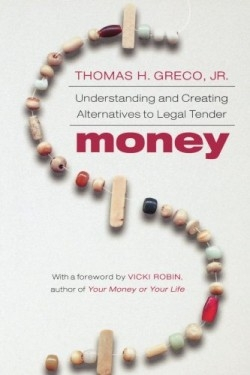
Money
Understanding and Creating Alternatives to Legal Tender
As As the condition of the economy worsens and more people are squeezed out of employment and financial security, readers will find this book a good source for possible solutions.
Fascinating on many levels, the book begins by offering insights into the current monetary system and its flaws. The author, a retired professor of business and economics who has spent twenty years studying community currency systems around the world, asserts that the system in the United States (indeed, in most countries) does not serve the communities that depend on it. Money is artificially scarce, he says, and is kept that way by banks, which, as originators of money, stand to gain by its scarcity. As globalization spreads and commerce becomes more a matter of bringing things from here to there, rather than buying locally produced goods, conditions only grow worse. The solution, says Greco, is to generate local income and keep it local, through an alternative currency system.
Alternative currency, which includes various systems of barter as well as the exchange of goods for services or a combination of such transactions, offers ways to reinvigorate foundering communities and put people to work when there is no money to pay them. It also offers a way for people with no cash to obtain the goods and services they need. Particularly valuable in instances where depressed economies have made multitudes reliant on public handouts or where official currencies have become almost worthless due to devaluations, such a system can rejuvenate not only communities but countries. Greco cites alternative systems in South America that conduct thousands of transactions daily, enabling people to feed their families and find work, with the possibility of returning to the conventional economy once some kind of stability has entered their lives.
Greco offers a look at historical alternative currencies, some that functioned during the Depression and some that were in use overseas during and after both World Wars. He examines currencies now in use abroad and on this continent, pointing out flaws and advantages in each system.
He also explores alternative systems of exchanging value (barter and locally issued currency among them). Having helped establish the Tucson Traderscurrency in Arizona, Greco offers practical suggestions on how to implement an alternative system in a local economy, with specifics on how to set up such a system and how to handle various situations that might arise.
Reviewed by
Marlene Satter
Disclosure: This article is not an endorsement, but a review. The publisher of this book provided free copies of the book to have their book reviewed by a professional reviewer. No fee was paid by the publisher for this review. Foreword Reviews only recommends books that we love. Foreword Magazine, Inc. is disclosing this in accordance with the Federal Trade Commission’s 16 CFR, Part 255.
